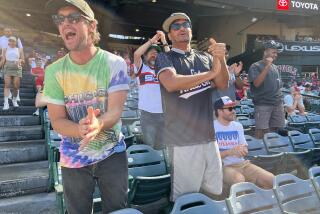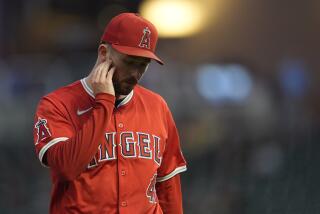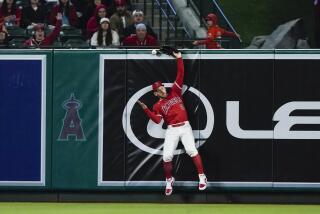Second Is One Frame to Keep
- Share via
MINNEAPOLIS — Touched by an Angel.
Of course that was it. What else could it be?
The Minnesota Twins turned up the rap music late Wednesday and wandered through their clubhouse with an unfamiliar wince.
“This is so ... unfortunate,” said first baseman Doug Mientkiewicz. “Real unfortunate.”
They had seen it happen seemingly everywhere else this fall, from Seattle to New York, this certain relentless baseball magic that leads to surrender.
And now it had happened to them? The team that was supposed to be the most magical of all?
In a second inning that defined a season, the Twins were touched by an Angel.
Six of them, to be exact.
For the rest of this American League championship series, neither team may be the same.
What should have been the Angels’ most embarrassing postseason inning became their most energized.
What could have been a grand Twins’ escape left them captives to doubt.
In a span of about 15 minutes, the Angels were fooled on the basepaths not once, not twice, but three times.
They survived to score not one, not two, but three runs.
In that same span, the sure-handed Twins made not one, not two, but three fielding mistakes.
They survived not.
If the Angels win this series that is tied at one game apiece after their 6-3 victory in Wednesday’s Game 2, everyone will look back at that second inning.
Yeah, they will say. It happened then.
“Sometimes you see some things and you just aren’t sure ... “ said Angel third base coach Ron Roenicke, as exhausted as any of the players.
Not sure how. Not sure why.
After the second inning, the Angels are going to stop asking.
“We just have to think, well, this is how it’s been all year for this team,” said second baseman Adam Kennedy. “So this is how it has to be.”
The victorious inning started with a concession speech.
Troy Glaus, behind 1-and-2 in the count, conceded to batting coach Mickey Hatcher that there are times he should shorten his swing and hit to right field.
So he did, slapping a single off Rick Reed, his first hit of the series.
“We were talking about this before the game, and I was telling him, make them adjust to you, go with what they give you,” Hatcher said afterward.
That tiny gold angel pin on Hatcher’s red uniform jacket was just a coincidence, right?
The next batter, Brad Fullmer, hit a looping shot to right-center field. Running to the ball was right fielder Michael Cuddyer.
But the rookie must not know Fullmer or the Angels, because he wasn’t running hard enough, and Fullmer sneaked to second base while moving Glaus to third.
Next up, Scott Spiezio, who hit a ball right back at Cuddyer, this time a blooper that was poorly played and bounced over the rookie’s head.
Glaus scored, Fullmer took third, Spiezio took second, and the Twins were growing angry.
“We have a real chip on our shoulder about our defense,” said Mientkiewicz. “We take this stuff personally.”
But then most of 55,990 breathed a sigh of relief when, one out later, on Kennedy’s bouncer back to the pitcher, Fullmer was caught running on contact and was thrown out at home without even drawing a rundown long enough to allow Kennedy to reach second.
That was the Angels’ first mistake.
Their second mistake occurred moments later when Kennedy was fooled by that cliche look-toward- third-then-throw-to-first pitching move.
Reed threw to first, Kennedy’s spikes dragged him to the turf, three out, inning over, right?
“But the thing about this team is, we never give up,” said David Eckstein, batting at the time.
So instead of quickly ending his embarrassment by allowing himself to be tagged, Kennedy hopped up and ran toward second base in hopes of causing a rundown.
Mientkiewicz, knowing this was Kennedy’s ploy, faked the throw to second base.
And sure enough ...
“I went for the fake and took off for home the minute his arm pumped,” said Spiezio.
The third mistake.
But look what happened next.
Mientkiewicz smartly threw the ball home. Spiezio, knowing he would be out if he slid, decided to attempt to run over the catcher.
A.J. Pierzynski, seemingly stunned that Spiezio was not sliding, applied a weak brush tag to his leg. The force of Spiezio’s knee knocked the ball loose, allowing that run to score.
The best part of it was, did you see where Kennedy ended up? Yep, he ran all the way to third base.
“That’s what we do,” he said.
Then did you see what Eckstein did?
After hitting three foul balls before the pickoff play, Eckstein fouled off another one after that, meaning he had fought off three two-strike pitches.
Then he singled to right, scoring Kennedy with the third run after perhaps his best at-bat in a postseason full of them.
“That was ugly, wasn’t it?” Eckstein said, grinning. “But you can always tell when I’m feeling good at the plate, because I’m fouling off a lot of balls.”
After Erstad flied out to end the inning, the score was still only 4-0.
But to a Twin team that rarely plays this poorly at home, it felt like 40-0.
“We did everything right,” said Manager Ron Gardenhire on the pickoff play, later adding, “We got everything right.... I don’t know what we could have done more.”
It is this sort of wonder that seeps into teams and weakens their will.
It is this sort of wonder that allowed the Angels to break the Seattle Mariners and Boston Red Sox in the final month of the regular season, and then finish the Yankees last week.
After losing a postseason game at the Metrodome for only the third time in 16 occasions Wednesday, the Twins probably flew toward California with all kind of emotions. Wondering. Wishing. Touched.
Bill Plaschke can be reached at [email protected].
More to Read
Go beyond the scoreboard
Get the latest on L.A.'s teams in the daily Sports Report newsletter.
You may occasionally receive promotional content from the Los Angeles Times.







